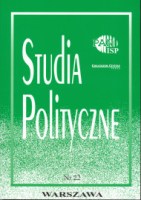Politonalność wyborów samorządowych. Opis zjawiska na przykładzie miasta średniej wielkości
The polytonality of local authority elections. Description of the phenomenon as exemplified by a medium-size town
Author(s): Łukasz Kubisz-MułaSubject(s): Politics / Political Sciences
Published by: Instytut Studiów Politycznych PAN
Summary/Abstract: The article's main objective is to attract attention to the polytonal character of local authority elections. Polytonal elections, also referred to by the author as sub-elections, arę elections to different representative bodies, held on the same day, but where such elections arę, nevertheless, different iii terms of conduct of the political actors (the electors, the politicians, the electoral committees, the political parties) and in terms of the influences which shape them. Since 2002, Polish local authority elections have combined several sub-elections simultaneously; elections to the communal councils, district councils and to county (voivodships) parliaments, as well as the election of city presidents, city and town mayors and heads of parishes. Research reveals that these elections are all ruled by different dynamics and have a different character. Apart from this, the author describes two patterns of electoral participation which are enhanced by the elections' polytonality, that is incomplete voting and inconsistent voting. Incomplete voting consists of the voter's foregoing their vote in some sub-elections. An inconsistent voting, on the other hand, consists of voting for the representatives of different electoral groupings in different sub-elections. The results of research carried out suggest that the voters who vote in an incomplete and an inconsistent way have a significant impact on the profile of elected local authorities. One might even risk saying that it is mostly thanks to these electors that the local authority elections, at least in the town where the research was carried out, approximate the ideal of non-partisan elections that society expects, being settled by the candidates' merits and focused on local issues, that society expects. The empirical grounds for the article were mostly provided by the data from an exit poll conducted in Bielsko-Biala during the local authority elections in 2006. The author also refers to his own survey of 2002, the State Electoral Commission data and the nation-wide CBOS polls.
Journal: Studia Polityczne
- Issue Year: 2008
- Issue No: 22
- Page Range: 53-70
- Page Count: 18
- Language: Polish

